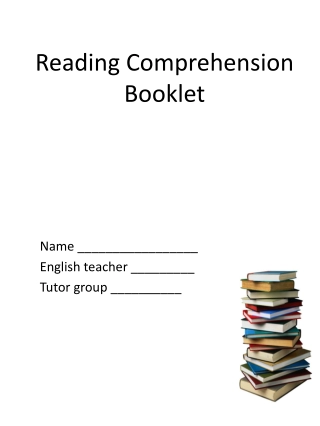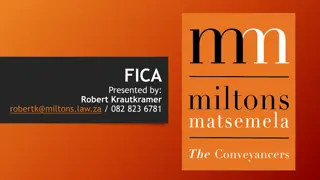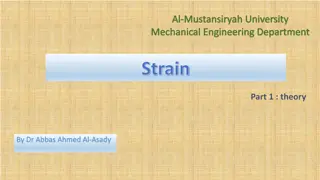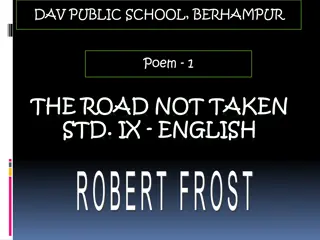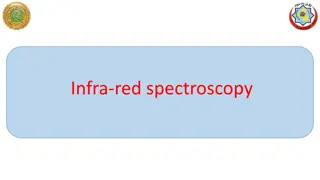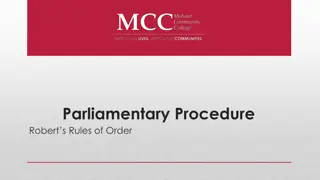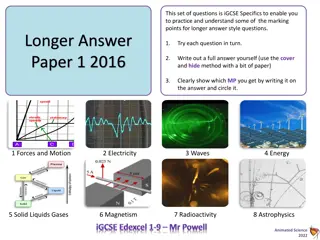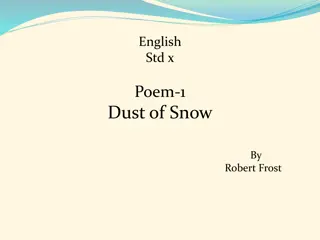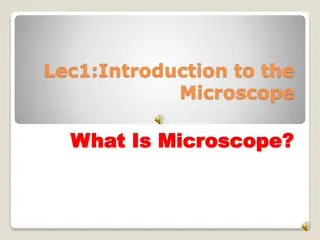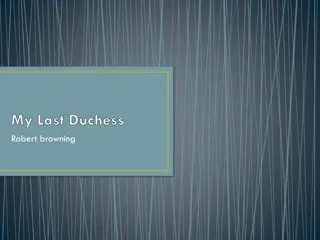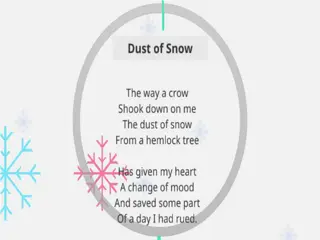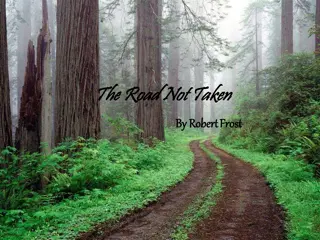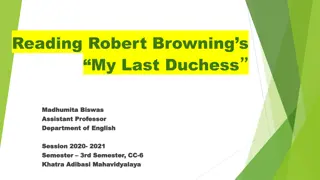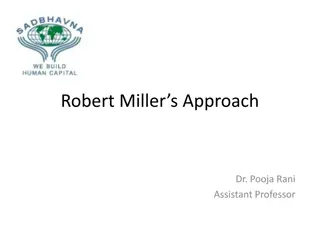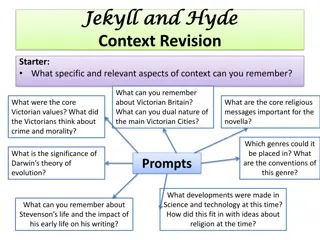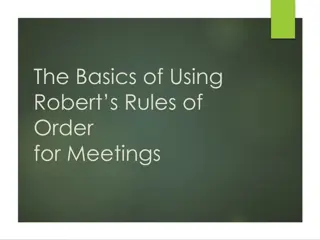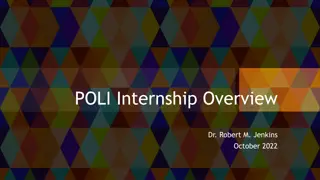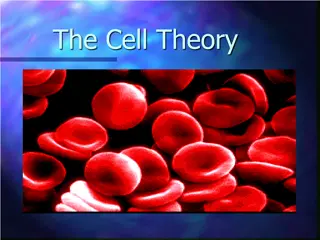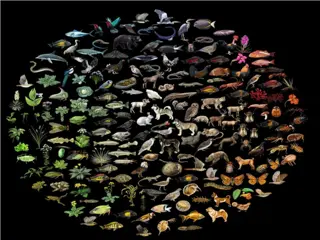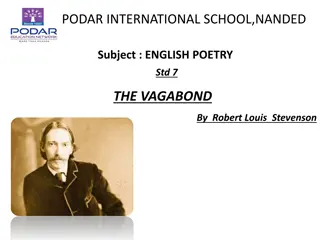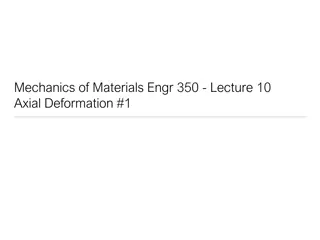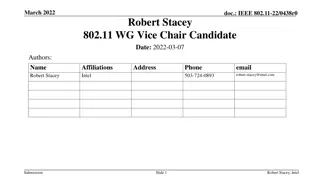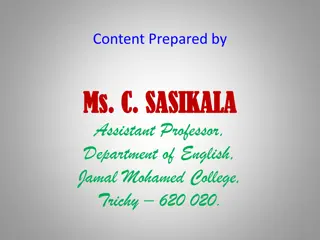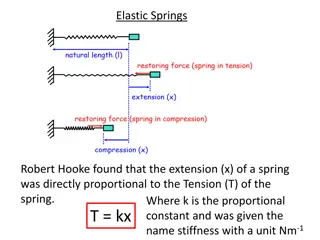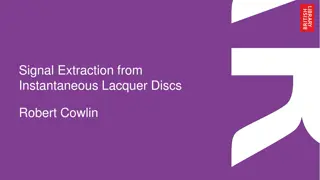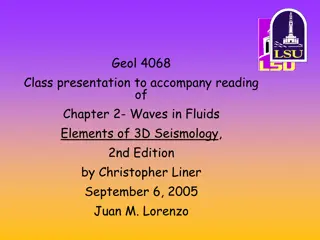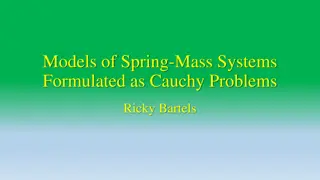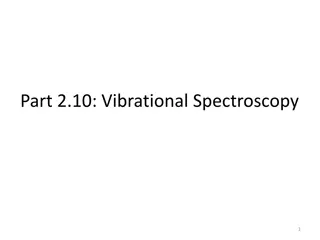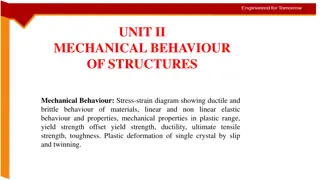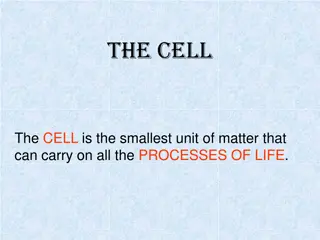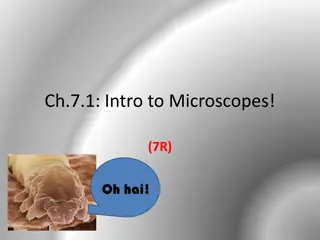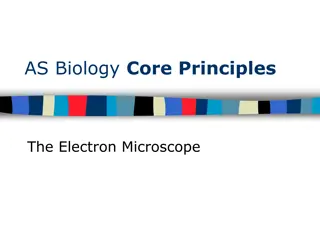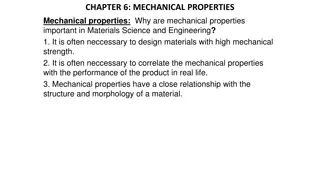Reading Comprehension: The Boys Toilets by Robert Westall
In this reading comprehension activity, students explore an excerpt from "The Boys Toilets" by Robert Westall. The passage sets a grim atmosphere as it describes a scene of chaos and decay at a school. Through detailed imagery and descriptions, the text evokes feelings of unease and desolation. Stud
0 views • 15 slides
FICA Presented by: Robert Krautkramer
FICA, presented by Robert Krautkramer, aims to create transparency in financial transactions to combat money laundering and terrorism financing. The content explains the concepts of money laundering, the risk-based approach for accountable institutions, and the specific requirements for AIs to compl
2 views • 33 slides
Robert Rauschenberg: Witness to His Time in History
Renowned artist Robert Rauschenberg, born in 1925 in Texas, left a significant mark on the art world through his innovative Combines series, which blurred the lines between painting and sculpture. His insightful quote, "The artist's job is to be a witness to his time in history," reflects his philos
2 views • 29 slides
Understanding Stresses and Analysis in Engineering
Stress is the internal resistance in a body when deformed, measured in Pascal (Pa) or Mega Pascal (MPa). Types of stress include shear, torsional, tensile, compressive, and bending stress. The relationship between stress and strain is crucial in material analysis, with materials categorized as ducti
3 views • 8 slides
VMware Horizon VDI at Robert Wood Johnson Medical School: Key Features and Architecture Overview
Explore VMware Horizon VDI implementation at Robert Wood Johnson Medical School, enabling streamlined image management, instant clone technology, efficient resource consumption, and flexible monitoring capabilities. The architecture overview covers Connection Servers, Unified Access Gateway, Admin C
1 views • 9 slides
Understanding Stress-Strain Behavior in Mechanical Engineering
The article explores the concepts of strain, stress, and the stress-strain diagram in mechanical engineering. It covers topics such as Hooke's Law, elastic limit, and the elastic and plastic ranges in materials. Various diagrams and explanations offer insights into the behavior of materials under di
1 views • 11 slides
Analysis of "The Road Not Taken" by Robert Frost
Analysis of Robert Frost's poem "The Road Not Taken," which explores the theme of choices shaping our destinies. The poem uses two roads as a metaphor for life decisions. It discusses the speaker's contemplation on which path to take and the consequences of the choice made. The first stanza sets the
1 views • 23 slides
Understanding Infrared Spectroscopy and Molecular Vibrations
Exploring the fascinating world of infrared spectroscopy and molecular vibrations. Learn about the different regions of the infrared spectrum, Hooke's law, vibrational frequencies, and the types of molecular vibrations. Discover how bond strength, reduced mass, and wave numbers are interconnected in
0 views • 18 slides
Comprehensive Guide to Parliamentary Procedure and Robert's Rules of Order
This comprehensive guide provides an in-depth look at parliamentary procedure and Robert's Rules of Order. It covers the roles of officers in meetings, the purpose and components of an agenda, what should be included in proceedings or minutes, sample agendas, making a motion, and steps necessary to
0 views • 9 slides
IGCSE Physics Practice Questions - Forces and Motion, Electricity, Waves, and More
Practice and understand marking points for longer answer questions in IGCSE Physics. Answer questions on topics like controlled nuclear fission, refraction, Hooke's Law, and electric motors to improve your knowledge and skills. Enhance your preparation with detailed explanations and marking points p
0 views • 8 slides
Dust of Snow by Robert Frost: A Brief Analysis
The poem "Dust of Snow" by Robert Frost captures a moment of transformation when a crow shakes off a dusting of snow onto the poet, changing his melancholy mood to joy and prompting a shift in perspective. Frost's vivid imagery and simple yet profound narrative highlight the power of small acts in b
0 views • 19 slides
Evolution of Microscopes: From Reading Stones to Phase-Contrast Microscopy
The history of microscopes dates back to the 11th century with the invention of the reading stone, leading to the creation of wearable eyeglasses in the 13th century. The first microscope was developed in the late 16th century by Zacharias Jansen, paving the way for the compound microscope and the t
0 views • 17 slides
Analysis of "My Last Duchess" by Robert Browning
The poem "My Last Duchess" by Robert Browning portrays the Duke of Ferrara showcasing a painting of his late Duchess to a visitor. Through the Duke's words, we uncover his controlling and possessive nature, highlighting his manipulation and jealousy over the Duchess's innocent demeanor. The Duke's r
0 views • 19 slides
Analysis of Robert Frost's Poem and Literary Devices Used
The short poem by Robert Frost delves into the profound healing power of nature and tiny entities. It highlights how nature can cure anything from a bad mood to ill-health. The poet's encounter with a crow near a hemlock tree, where snow was dusted upon him, instantly changes his mood, making his da
0 views • 12 slides
Decisions in the Woods: Analysis of Robert Frost's "The Road Not Taken
Exploring Robert Frost's iconic poem "The Road Not Taken" which delves into themes of choices, regrets, and the paths we choose in life. Frost's symbolic use of two roads in a wood captures the essence of decision-making and the consequences that follow. The speaker's contemplation between diverging
1 views • 16 slides
Understanding "My Last Duchess" by Robert Browning - Analysis and Interpretations
This analysis delves into the dramatic monologue "My Last Duchess" by Robert Browning, exploring themes of power, control, and possession through the Duke's chilling narrative about his late wife. The in-depth examination reveals the Duke's possessive nature, shedding light on societal expectations
6 views • 8 slides
Understanding Robert Miller's Approach in Skill Development
Robert Miller's approach, originating in military science, emphasizes writing objectives for the psychomotor domain with a focus on skill analysis and physical activities. The method involves three key elements: Indication (Stimulus), Activation (responses), and Feedback. It aims to develop skills a
0 views • 9 slides
Understanding Context in Jekyll and Hyde: Victorian Britain and Robert Louis Stevenson
Explore the social, economic, and moral landscape of Victorian Britain as reflected in Robert Louis Stevenson's life and novella, "Strange Case of Dr Jekyll and Mr Hyde." Delve into the dual nature of Victorian cities, core values, views on crime and morality, religious influences, and the significa
0 views • 12 slides
Mastering Robert's Rules of Order for Effective Meetings
Learn the key principles of Robert's Rules of Order to conduct meetings successfully. Understand the importance of protecting the rights of all members, the significance of quorum, decision-making processes, debate etiquette, and the role of the meeting chair for efficient discussions. Follow these
0 views • 23 slides
POLI Internship Overview with Dr. Robert M. Jenkins - October 2022
POLI Internship Overview with Dr. Robert M. Jenkins for October 2022 provides detailed information on the internship process, academic requirements, sources of internship information, and the online contract process. It emphasizes the student's role in taking charge of finding an internship, securin
0 views • 9 slides
The Fascinating Journey of Cell Theory and Discoveries
Delve into the historical milestones of cell theory discovery, from Robert Hooke's observations of cork cells to Louis Pasteur's refutation of Spontaneous Generation. Explore the contributions of key figures like Matthias Schleiden, Theodor Schwann, and Rudolf Virchow in shaping our understanding of
0 views • 13 slides
Evolution of Cell Theory: From Observations to Modern Understanding
Robert Hooke and Robert Brown made key observations leading to the cell theory, while M.J. Schleiden, Theodore Schwann, and Rudolf Virchow developed the foundational principles. The modern cell theory expanded to include energy flow, heredity, and cell composition. Protoplasm theory highlighted the
8 views • 20 slides
Analysis of "The Vagabond" by Robert Louis Stevenson
The poem "The Vagabond" by Robert Louis Stevenson explores the free-spirited life of a vagabond who finds joy in wandering and embracing nature. The central theme revolves around the vagabond's preference for a life of freedom and movement over material wealth and societal ties. Each stanza of the p
0 views • 10 slides
Understanding Stress-Strain Behavior in Materials
The stress-strain diagram illustrates how materials respond to mechanical forces, showcasing various properties such as elastic limit, yield point, ultimate strength, and rupture strength. By analyzing the curve, engineers can determine the material's behavior under different loads and stresses, aid
0 views • 6 slides
Understanding Axial Deformation in Mechanics of Materials
In the study of mechanics of materials, axial deformation is analyzed by simplifying real structural elements. This approach involves approximations that are generally satisfactory and work due to factors like allowable stress design, factor of safety, and statistical analysis of strength. Saint-Ven
0 views • 9 slides
Robert Stacey's Candidacy for IEEE 802.11 WG Vice Chair
Robert Stacey, a candidate for IEEE 802.11 WG Vice Chair, brings extensive qualifications and a strong commitment to further the organization's mission. With a deep technical understanding and a proven track record of supporting collaboration and process improvement, Robert presents a compelling cas
0 views • 5 slides
Analysis of Robert Frost's Poem "The Road Not Taken
This content prepared by Ms. C. Sasikala, an Assistant Professor of English, delves into the analysis of Robert Frost's renowned poem "The Road Not Taken." It provides an in-depth examination of the author's background, the impact of his works, themes in his poetry, his inspiration, and the use of n
0 views • 24 slides
Understanding Hooke's Law for Elastic Springs
Robert Hooke discovered Hooke's Law, stating that the extension of a spring is directly proportional to the tension applied to it, with a constant called stiffness. The modulus of elasticity is the inverse of the natural length of the spring. By applying the formulas derived from Hooke's Law, you ca
0 views • 40 slides
Signal Extraction from Instantaneous Lacquer Discs - Overview and Procedures
Delve into the world of lacquer discs with a comprehensive guide on signal extraction, format characteristics, preservation techniques, and stylus selection. Explore the Emelie Hooke lacquer disc collection and learn about the transfer workflow, cleaning, and preparation steps involved in handling t
4 views • 23 slides
Understanding Waves in Fluids: Geol 4068 Class Presentation
This presentation accompanies the reading of Chapter 2 on Waves in Fluids from "Elements of 3D Seismology" by Christopher Liner. It covers topics like fluid properties, elastic moduli, acoustic wave equations, seismic materials, and key physical parameters of acoustic waves. The importance of veloci
0 views • 18 slides
Understanding Spring-Mass Systems: Formulation and Modeling
Exploring the formulation and modeling of spring-mass systems as Cauchy problems, focusing on the basics of Hooke's Law and Newton's Second Law of Motion. Dive into the analysis of systems with multiple masses and springs, examining the ODEs that describe their motion and the formulation of solution
1 views • 40 slides
Understanding Molecular Vibrations in Vibrational Spectroscopy
Explore the world of molecular vibrations and their significance in vibrational spectroscopy. Learn about the different types of vibrations in diatomic and triatomic molecules, the concept of degrees of freedom, and how atoms change positions to create varying bond lengths and angles. Discover the r
0 views • 47 slides
Designing a Safe Bungee Cord for Washy Meet Washy!
Engineering students embark on a challenge to create a safe bungee cord for Washy at Crazy Town. Through story time, defining forces, brainstorming, and discussing cord lengths, they learn about displacement, force calculation, and using Hooke's law for spring constant. The activity aims to measure
0 views • 27 slides
Mechanical Behavior of Structures: Stress-Strain Diagrams and Elastic Properties
Understanding the mechanical behavior of structures involves analyzing stress-strain diagrams, distinguishing between ductile and brittle materials, exploring linear and non-linear elastic properties, studying plastic deformation, yield strength, ultimate tensile strength, and toughness. Elastic beh
0 views • 32 slides
Exploring the Fascinating World of Cells and Organelles
Delve into the intriguing realm of cells and organelles, the building blocks of life. Discover the origins of the cell theory, the contributions of pioneers like Anton von Leeuwenhoek and Robert Hooke, and the essential functions of key organelles like the cell membrane, nucleus, mitochondria, and m
0 views • 31 slides
The Fascinating World of Microscopes: From Ancient Origins to Modern Mechanisms
Delve into the intriguing history of microscopes, from ancient experimentation to the innovative creations of individuals like Zacharias Janssen, Anthony van Leeuwenhoek, and Robert Hooke. Explore how these optical instruments work, utilizing convex lenses to bend and focus light for magnification.
0 views • 27 slides
Exploring Microscopes: From History to Modern Advances
Delve into the fascinating world of microscopes, from the basic designs of the past to the sophisticated electron microscopes of today. Discover the significant figures who shaped microscopy, such as the Janssen brothers, Robert Hooke, and Anton van Leeuwenhoek. Learn about the essential parts and f
0 views • 22 slides
Exploring Microscopy: Light vs Electron Microscopes
Microscopy has evolved significantly since Robert Hooke's discovery of cells in cork in 1665. This article delves into the fundamental principles of light and electron microscopes, discussing resolving power, magnification capabilities, and the differences between these two essential tools in biolog
0 views • 17 slides
Importance of Mechanical Properties in Materials Science and Engineering
Mechanical properties play a crucial role in designing materials for high strength, understanding real-life performance, and correlating with structure. Key concepts include stress, strain, tension tests, compression tests, shear tests, and torsional tests, which help in assessing a material's behav
0 views • 10 slides
Analyzing "A Red, Red Rose" by Robert Burns: Love, Immortality, and Symbolism
In this analysis, we delve into Robert Burns' poem "A Red, Red Rose," exploring the theme of everlasting love and the speaker's expressive portrayal of his beloved through vivid imagery. The poem symbolizes the enduring nature of true love, contrasting it with the transience of youth and beauty. By
0 views • 22 slides
